Alumni News
Reverend Kate Galop is Massachusetts State Police’s First Female Chaplain
This was originally published by the MSPNews on October 14, 2022, and can be found here.
Massachusetts State Police Colonel Christopher Mason on Wednesday, Oct. 12, welcomed Reverend Dr. Kate Galop as

a new member of the Department’s Chaplain Corps.
Reverend Galop, the MSP’s first female Chaplain, serves as the Pastor of Faith United Methodist Church in Chicopee.
Colonel Mason said Reverend Galop’s appointment is part of an effort to expand the MSP’s Chaplaincy mission to “create more opportunities for officers to engage” clergy as they deal with the stresses and challenges of the law enforcement profession. Colonel Mason said the mission of police Chaplains is an important component of overall officer wellness.
Reverend Galop was sworn-in in Colonel Mason’s office at General Headquarters in front of five of the Department’s six other Chaplains.
Prior to being ordained as Pastor at Faith United Methodist, Reverend Galop served as Senior Pastor at Westport Point United Methodist Church. Previous to that she served as assistant to the pastor of Northside Methodist Church in Brewster. She holds Doctorate of Ministry and Master of Divinity degrees from Liberty Baptist Theological Seminary in Lynchburg, Va., and earned an ordination certification from Boston University’s School of Theology.
Dr. Yara Gonzalez-Justiniano (STH’14,’19) Publishes Book: Centering Hope as a Sustainable Decolonial Practice: Esperanza en Práctica
Dr. Yara Gonzalez- Justiniano (STH'14, '19) published Centering Hope as Sustainable Decolonial Practice: Esperanza en Práctica on Septermer 23, 2022.
Justiniano (STH'14, '19) published Centering Hope as Sustainable Decolonial Practice: Esperanza en Práctica on Septermer 23, 2022.
The overview of the book states:
Where is the hope? What does it look like? Is the Christian church providing a hope that materializes in the grounding of people’s thriving? These questions posed the catalysts of this work where the author sets up a journey that parses the definition of hope within Christian theology as an ontological category of the human experience. Through ethnographic research and ecclesial study of diverse congregations in Puerto Rico the work moves from an articulation of context, hope, practice, and future to reveal its aim of liberation through a hope that can be sustainable in time and space. She analyzes the operations of political systems that suppress hope in the island. Weaving the theme of a theology of hope, with the fields of ecclesiology, memory studies, postcolonial and decolonial theory, liberation theology, and the study of social movements she builds a model that puts hope at the center of socio-economic practices and moves toward a recipe for a hope that is sustainable in practice.
Find a copy of the book here.
Tom Reid’s (STH’19) Blog Post: Memory Problems
This was originally published by the Patheos on October 4, 2022, and can be found here.
Excerpt from original article:
Parashat Ha’azinu (Deuteronomy 32:1-52)
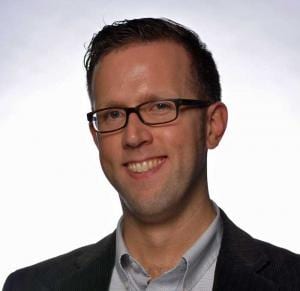 Why did I choose to write on this particular parashah? As I read it again, I find myself struggling with several passages in this portion.
Why did I choose to write on this particular parashah? As I read it again, I find myself struggling with several passages in this portion.
Perhaps struggle is appropriate during the Ten Days of Teshuvah (Return, Remorse, and Renewal), this season of soul-searching (heshbon-nefesh), which calls the Jewish community to grapple with the fullness of life, including its challenges.
And as a Presbyterian pastor, taking on Ha’azinu affords me the opportunity to do a mitzvah of sorts, by giving my rabbinical friends and colleagues some breathing room, as they prepare their Yom Kippur services and sermons, while still recovering from the many hours of tefillah (prayer) leadership over Rosh Hashanah!
I turn my attention to the opening of this week’s portion. For context, Moses, nearing the end of his life, exhorts his people to remember the past in its entirety—the good, the bad, and the ugly. No one can claim ignorance as the nation marches ever closer to the Promised Land.
“This poem shall confront them as a witness,
since it will never be lost from the mouth of their offspring” (Deuteronomy 31:21).
The poem begins beautifully reinforcing the interconnectedness of the universe, which is entirely bound up in God:
“Let the earth hear the words I utter!
May my discourse come down as the rain… like showers on young growth,
like droplets on the grass” (32:1-2).
Yet, Moses quickly turns from God’s faithfulness to the faithless and crooked responses of God’s children. The prophet describes how God, vexed and pained by their behavior, will turn away from Israel, hiding the divine face. As a result, it is punishment that will rain down upon the wayward.
To be honest, I am troubled by this sudden turn in the text and the poem. Why the abrupt shift? Why did Moses feel the need to issue a stern and ominous warning at this time? When faced with imminent death, these are the words that come forth from the mouth of this sagacious leader? And his exhortation is directed not only at the current generation, but future generations as well.
Perhaps he is afraid. After all, he is being told that his death is imminent and that he will not be allowed to enter the Promised Land despite his efforts to guide the people there through countless obstacles. He could understandably be afraid of what will become of him as an individual. Perhaps he fears what will happen to his children and his family after he dies. And perhaps he is afraid for his tribe (the Levites) and the Israelites as a whole. He is too keenly aware of the past missteps of the Children of Israel and the consequences of their selfishness, greed, anger and fear. Despite his work to be faithful and to keep them faithful, this human instinct—to fall back on idols and spiritual technologies that are believed to be more of a “sure thing”—is often too great a force for a mere mortal to contend with. Maybe this is why the prophet calls on heaven and earth to bear witness to his words.
Read the full article here.
Reverend Yunki Kim (STH’12) Appointed to Gales Ferry Church
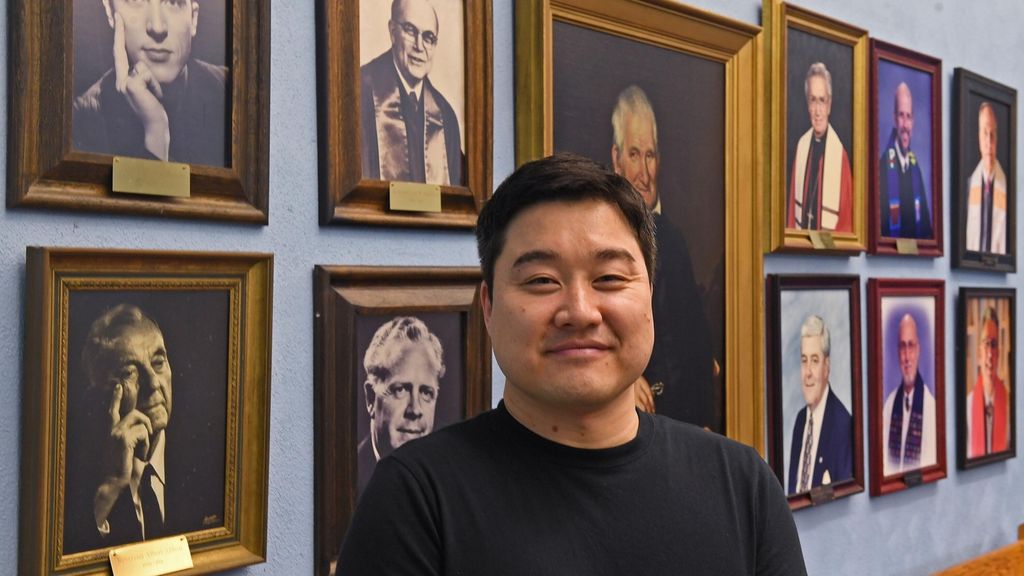 This was originally published by the The Day on October 1, 2022, and can be found here.
This was originally published by the The Day on October 1, 2022, and can be found here.
Excerpt from original article:
Ledyard ― Through his childhood and into young adulthood, Yunki Kim identified how society labeled him: He was a Korean immigrant living in Egypt, the pastor’s kid, the one going to a nice college. But that changed when he was doing the two years of military service mandated in Korea and he was assigned to assist the chaplain, counseling soldiers.
“That’s when I really got to hear the diverse stories of where these folks were coming from, so that was a life-changing experience for me,” Kim said.
But it would hardly be the last time that Kim reflected and reassessed. Going to the Boston University School of Theology gave him “theological direction of who I’m going to be as a pastor,” which was as someone who is more progressive and “yearning for a more inclusive way of being a church.”
It’s a mindset that Kim, 39, has brought with him to his new role as pastor at the United Methodist Church of Gales Ferry. He started July 1 and lives in the parsonage with his wife, Hyoeun Song, and kids Noah and Zoey, 9 and 5. Dan Reilly, lay leader of the United Methodist Church of Gales Ferry, said this is the first time since the 1970s that the parsonage has had elementary-aged children.
“He jumped right in and he’s providing a great new vision for us on a lot of things,” Reilly said, adding that Kim is singing with the choir and Song is ringing handbells. He said Kim is relatable, has good personal stories, and is easy to listen to.
“It’s nice to have someone with a diverse set of tools, and a diverse background, to lead the congregation in a way that makes sense to him and to us,” organist Jake Troy said, adding that Kim “has quickly adapted himself to our love of music, and making sure that he is using that to his advantage when reaching out to the congregation and the wider community.”
Kim said there are about 75 people in attendance on Sundays and 15 tuning in online, and Sunday school just started back up for children and adults. He praised the strong music ministry at the church.
His sermons have been more introductory so far, with the message that “the blessing that we have is we have each other, and we’re going to do it together.”
He’s still learning about Gales Ferry and Ledyard ― and about the community in relationship to Norwich, Groton and New London ― to know what kind of ministries to offer.
Kim, who is the first nonwhite pastor of the church, also said he’s interested in learning about the land on which the church sits, about the Native American history.
His vision for the church is to help everyone experience peace and love regardless of their background, immigration status, gender identity, age, or political views. But on a global level, there’s division within the United Methodist Church over LGBTQ rights.
In 1972, the General Conference ― a body of representatives that meets every four years ― voted to add the language that “the practice of homosexuality is incompatible with Christian teaching.” According to the UMC website, pastors can’t conduct same-sex wedding ceremonies.
Kim said he hopes the language is changed or removed altogether at the next General Conference in 2024. His dream is for a church where both progressive and traditionalist voices can have space.
Read the full article here.
BUSTH Announces Faculty Publications for January 2023
The School of Theology is pleased to announce the following faculty publications for January 2023:
- Choi Hee An, et al
-
Sandage, S.J., & Choi, H.A. (2022). Intellectual humility in applied sociocultural contexts: A reply to Ballantyne. Journal of Positive Psychology. DOI: 10.1080/17439760.2022.2155224.
-
- Daryl Ireland, et al
-
Ireland, D. R., & Li, D. (2022). Lift High the Cross: The Visual Message of Popular Chinese Christianity. International Bulletin of Mission Research, 46(4), 474–491. https://doi.org/10.1177/23969393221097624
-
- Luis Menéndez-Antuña
-
“The Colonies Strike Back: How Latin-American Liberation Theology Saved Christianity in Post-dictatorial Spain” in Jin Young Choi and Gregory Cuéllar (eds.) Activist Hermeneutics of Liberation in the Bible. A Global Intersectional Perspective (London; New York: Routledge, 2023), 41–59.
-
- Dana L. Robert
-
“Make Jesus King” and the Evangelical Missionary Imagination, 1889-1896,” in Global Faith and Worldly Power: Evangelical Encounters with American Empire, edited by John Corrigan, Axel Schäfer, Melani McAlister (Chapel Hill: UNC, 2022):122-142.
-
- Steven Sandage, et al
-
Sandage, S.J., & Choi, H.A. (2022). Intellectual humility in applied sociocultural contexts: A reply to Ballantyne. Journal of Positive Psychology. DOI: 10.1080/17439760.2022.2155224.
-
Marmarosh, C.L., Sandage, S.J., Wade, N., Captari, L.E., & Crabtree, S.A. (2022). New horizons in group psychotherapy research and practice from Third Wave Positive Psychology: A practice-friendly review. Research in Psychotherapy: Psychopathology, Process and Outcome, 25, 258-270. https://doi.org/10.4081/ripppo.2022.643
-
Prof. James McCarty elected to Board of Directors of Society of Christian Ethics
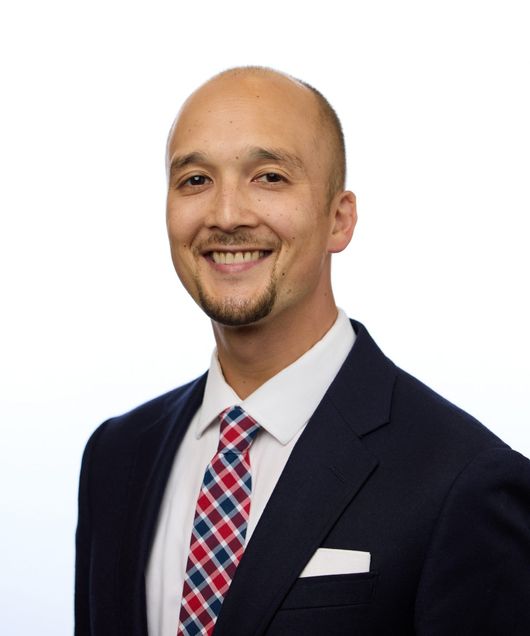
The Society of Christian Ethics (SCE) announced in a recent social media post that Assistant Clinical Professor of Religion and Conflict Transformation James McCarty has been elected to their Board of Directors. The non-denominational SCE was founded in the 1950s and today has more than 850 active members, including professors of ethics and clergy members, as well as scholars of social policy. The Society promotes research in the fields of Christian ethics and moral theology, among others, as well as addresses global and local contextual issues of human rights and social justices.
“I am excited to join the board of the largest and most prestigious organization devoted to the work of Christian ethics,” says Prof. McCarty. “The SCE has been an intellectual and spiritual home for my entire career and serving in this leadership position is an honor. I hope to be a voice of wisdom and courage in this divisive moment in our history and to bring the skills I teach to students with me in my work for the society.”
Many congratulations to Prof. McCarty on this new appointment.
Prof. Shively T. J. Smith receives 2022 Forum for Theological Exploration Excellence in Mentoring Award
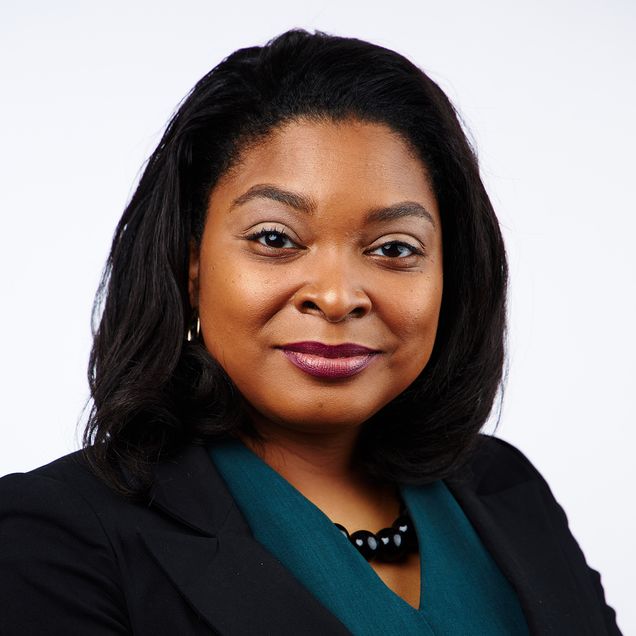
The Forum for Theological Exploration (FTE) announced in a recent social media post that Assistant Professor of New Testament Shively T. J. Smith has been awarded the 2022 Excellence in Mentoring Award. The award is given to one FTE doctoral mentor each year who demonstrates commitment to the academic advancement of students of color.
Professor Smith was recognized as the 2018 Scholar in Residence for Foundry UMC in Washington, DC and, currently, serves as the Scholar in Residence at the “Cathedral of the AME,” Metropolitan AME Church in Washington, DC.
Many congratulations to Prof. Smith on receiving this prestigious award.
Prof. Karen Westerfield Tucker Presented with Berakah Award by North American Academy of Liturgy
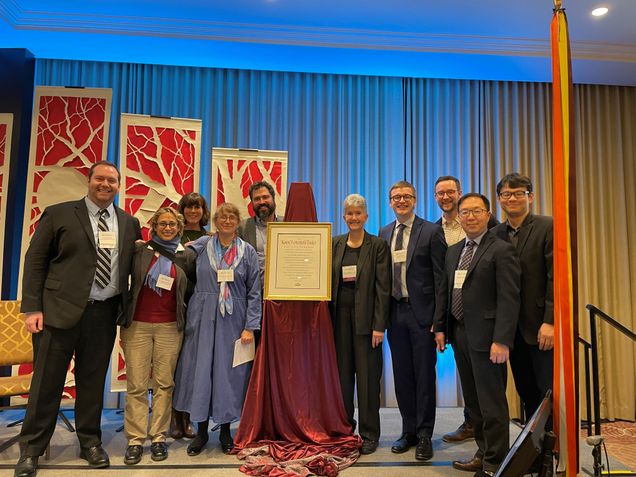 Updated on January 9, 2023:
Updated on January 9, 2023:
In early January, Professor of Worship Karen Westerfield Tucker officially received the Berakah Award in Toronto, Canada, presented by the North American Academy of Liturgy. Many STH alums and current students were in attendance, as pictured above, left to right:
- Rev. Kristian Kohler, PhD student
- Dr. Stephanie Budwey, ThD’12; Luce Dean’s Faculty Fellow Assistant Professor of the History and Practice of Christian Worship and the Arts, Vanderbilt University
- Dr. Heather Josselyn-Cranson, ThD’05; Associate Professor of Music and Humanities, Regis College
- Rev. Dr. Sarah Mount Elewononi, PhD’14; Adjunct Instructor, Wesley Theological Seminary
- Rev. Dr. Matthew Sigler, PhD’14; Associate Professor of Worship and Historical Theology, Seattle Pacific University
- Rev. Dr. Karen Westerfield Tucker
- Rev. Dr. David Bjorlin, PhD’18; Assistant Professor of Worship, North Park University
- Rev. Dr. Nelson Cowan, PhD’19; Director of the Center for Worship and the Arts, Samford University
- Mr. Sze-Long Aaron Wong, current PhD student
- The Rev. Dr. Jonghyun Kim, STM’14
Original post from May 9, 2022:
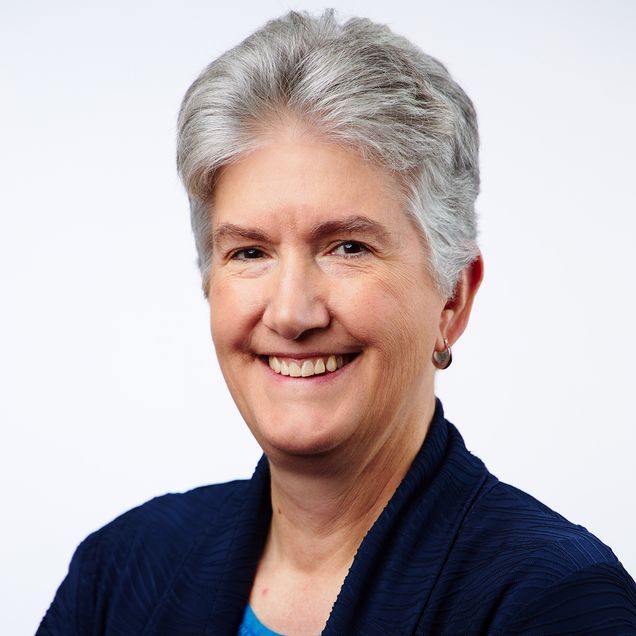
The North American Academy of Liturgy (NAAL) announced in its latest newsletter that Boston University School of Theology Professor of Worship Karen Westerfield Tucker is the 2023 recipient of the prestigious Berakah Award. The NAAL plans to present the award to Prof. Westerfield Tucker in person at its annual meeting in January 2023 in Toronto, Ontario.
The Berakah Award is bestowed to members of the NAAL, and is given to liturgical scholars and practitioners in recognition of distinguished contribution to the profession. Recommendations for the award are made by members of the Academy, and the award has been presented every year since 1976. Prof. Westerfield Tucker is only the ninth woman and the fifth United Methodist to receive this award.
Prof. Westerfield Tucker has been teaching at the Boston University School of Theology since 2004. She is a United Methodist elder affiliated with the Illinois Great Rivers Conference, and is a past president of the ecumenical and international Societas Liturgica. For nine years, she was the editor-in-chief of the society’s journal Studia Liturgica.
Prof. Shelly Rambo and Prof. Steven Sandage deliver Lectures at Therapy and Spiritual Care Conference
This past fall, the Danielsen Institute hosted an important conference that brought together thought leaders in the fields of spiritual care and mental health, and focused on the well-being of caregivers amidst burnout and compassion fatigue. Titled Therapy and Spiritual Care in a Shattered World: Transforming the Community of Healers, the conference was held online at Boston University and attended by over 800 viewers from around the world.
Sessions included “Existential Overwhelm and the Value of Nurturing Questions over Time: Implications for Metabolizing Vicarious Trauma and Moral Distress to Promote Resilience,” led by Assistant Professor of Theology Shelly Rambo, and “Seeking Well-Being in Territories of Despair: Relational Strengths for Practitioner Formation” by Albert and Jessie Danielsen Professor of Psychology of Religion and Theology Steven Sandage.
Below, Prof. Sandage opened the conference by addressing attendees that “[t]he last three years have caused us to make so many professional and personal adjustments while trying to cope with agonizing losses, and deal with the demoralization that comes with our political and social upheaval and division.” The playlist of all conference sessions is available here.
The conference was made possible by a grant from the Peale Foundation, “Positive Psychology and Formation-Based Flourishing Among Spiritual Leaders and Therapists.”
BUSTH DMin Student Joanne Hus Published in The Salem News
The following is an excerpt from The Salem News article “God risks it all” by BUSTH doctor of ministry student Joanne Hus, published on December 14, 2022. Click here to read the full article. The views and opinions expressed herein are those of the author and do not necessarily reflect the views of Boston University School of Theology, its employees, faculty, or students.
When God created human beings in the divine image of God, God also gave us free will. Free will may not seem like a particularly big deal since we exercise free will every waking moment, from choosing what we’ll eat for breakfast, to how we’ll treat the people we meet throughout the day, to what thoughts we’ll dwell on as we fall asleep at night. We may take free will for granted. But the fact that God entrusts us with free will is simply astonishing.
